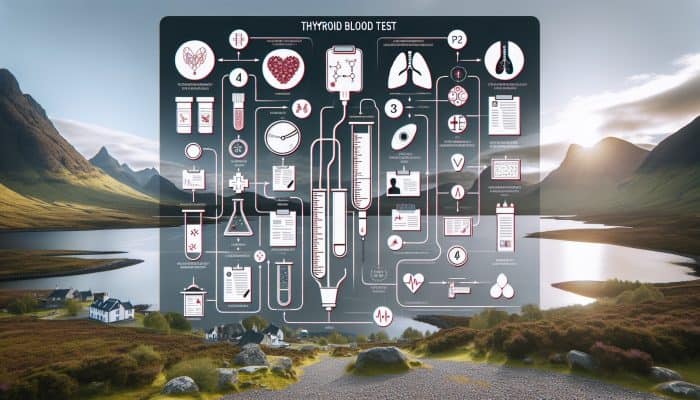Comprehensive Overview of Thyroid Function and Wellness
Explore the Vital Roles of Your Thyroid Gland

The thyroid gland, a small but crucial organ resembling a butterfly, is situated at the front of the neck, just beneath the Adam’s apple. This gland is instrumental in maintaining the body’s hormonal balance by producing essential hormones like thyroxine (T4) and triiodothyronine (T3). These hormones are vital for regulating numerous physiological functions, including metabolism, growth, and energy levels. The thyroid operates under the regulatory influence of the hypothalamus and the pituitary gland, which work together to maintain balanced hormone levels through a complex feedback loop. Understanding this intricate relationship is essential for promoting and sustaining thyroid health and overall bodily function.
When thyroid function is disrupted, it can lead to significant health challenges, as the hormones produced by this gland directly affect metabolism, growth, and overall energy levels. Many individuals in the UK may remain unaware of the thyroid’s essential role until symptoms manifest, often requiring a thyroid blood test in Inverness. By increasing awareness and comprehension of the thyroid’s functions, individuals can take a proactive stance regarding their health, particularly if they begin to notice signs indicative of potential thyroid dysfunction.
The Significant Role of Thyroid Hormones in Your Health
Thyroid hormones play a fundamental role in the efficient functioning of metabolism, influencing everything from energy production to digestive efficiency. These hormones are crucial in regulating the body’s metabolic rate, which ultimately dictates how effectively food is converted into energy. This metabolic process is vital for maintaining a healthy weight and ensuring that all bodily systems operate optimally, which is essential for overall health and well-being.
Beyond metabolism, thyroid hormones are indispensable for proper growth and development, affecting muscle strength, bone density, and cardiovascular health. For children and teenagers, adequate levels of these hormones are essential for cognitive development and physical growth. In adults, maintaining a balanced level of thyroid hormones significantly impacts mental health and emotional stability, influencing mood and overall energy levels. This underscores the importance of keeping thyroid hormone levels within a healthy range to foster long-term health.
Within the UK healthcare framework, acknowledging the importance of thyroid hormones highlights the necessity for consistent monitoring. Many individuals may experience symptoms of thyroid dysfunction without connecting them to their thyroid health. A simple thyroid blood test in Inverness can identify underlying hormonal imbalances, allowing for timely intervention and improved health outcomes for those affected.
Proactively Spotting Symptoms of Thyroid Dysfunction
Identifying the symptoms of thyroid dysfunction is critical for early detection and effective management of potential health issues. Common signs include persistent fatigue, unexplained fluctuations in weight, and mood changes. Individuals suffering from hypothyroidism may experience lethargy and depressive symptoms, while those with hyperthyroidism may encounter increased anxiety and restlessness. These symptoms can often be vague or misattributed to other health conditions, highlighting the need for greater awareness.
Other symptoms may include alterations in hair and skin condition, heightened sensitivity to temperature changes, and disruptions in sleep patterns. For instance, individuals with hypothyroidism often report dry skin and thinning hair, while those with hyperthyroidism may experience excessive sweating and rapid heart rates. If you notice any of these signs, it is crucial to consult a healthcare professional who might recommend a thyroid blood test in Inverness to accurately diagnose the underlying causes.
Regular testing becomes particularly vital for those with a family history of thyroid disorders or autoimmune diseases, as these populations face an increased risk of developing thyroid dysfunction. By being cognizant of the signs of thyroid issues, individuals can take proactive control of their health and seek appropriate medical interventions, ultimately leading to better health management and an enhanced quality of life.
Comprehensive Review of Thyroid Blood Testing Procedures

Understanding the Significance of the TSH Test
The Thyroid-Stimulating Hormone (TSH) test is a cornerstone of thyroid evaluations, acting as a primary indicator of thyroid function. Produced by the pituitary gland, TSH regulates the synthesis of thyroid hormones. Normal TSH levels indicate effective functioning of the thyroid, whereas elevated levels may suggest hypothyroidism, indicating that the thyroid is underactive and insufficiently producing hormones.
Grasping the significance of TSH levels is essential for accurately diagnosing thyroid disorders and formulating appropriate treatment strategies. In the UK, healthcare professionals commonly utilise the TSH test as the initial assessment when thyroid disorders are suspected. For residents of Inverness, obtaining a thyroid blood test in Inverness that includes TSH measurement is a straightforward process, accessible through local NHS services or private clinics.
Interpreting TSH levels requires contextual understanding; factors such as age, pregnancy, and certain medications can greatly influence results. Therefore, a comprehensive evaluation, including a detailed medical history, is often necessary for accurate diagnosis. Individuals experiencing symptoms of thyroid dysfunction should consult their GP, who may recommend additional testing based on TSH results to ensure comprehensive care and personalised treatment plans.
Evaluating Active Hormones: Insights into Free T4 and Free T3 Tests
The Free T4 and Free T3 tests assess the concentrations of active thyroid hormones circulating in the bloodstream. Free T4 (thyroxine) and Free T3 (triiodothyronine) are critical for regulating metabolism and energy levels throughout the body. While T4 is produced in larger quantities, T3 is the more biologically active form of thyroid hormone, exerting more immediate effects on various tissues.
By conducting these tests, healthcare professionals can determine if the thyroid is producing sufficient hormone levels. In instances where TSH levels are abnormal, evaluating Free T4 and Free T3 provides deeper insights into the specific nature of the thyroid dysfunction. For example, elevated Free T4 levels alongside high TSH levels may indicate a pituitary issue, while low Free T4 levels and elevated TSH levels typically suggest hypothyroidism.
For those in Inverness seeking clarity about their thyroid health, a thyroid blood test in Inverness that includes Free T4 and Free T3 analyses can provide essential insights. Understanding these hormone levels is crucial for creating appropriate treatment strategies, which may involve medication, lifestyle modifications, or further investigative measures.
Diagnosing Autoimmune Disorders through Thyroid Antibody Testing

Thyroid antibody tests are crucial for diagnosing autoimmune thyroid disorders such as Hashimoto’s disease and Graves’ disease. These conditions occur when the immune system mistakenly attacks the thyroid gland, disrupting hormone production. By identifying specific antibodies in the blood, these tests illuminate the underlying causes of thyroid dysfunction.
In the UK, thyroid antibody tests are frequently recommended for patients exhibiting symptoms of thyroid disease, even when TSH and hormone levels appear normal. Elevated thyroid antibody levels can indicate an autoimmune response, necessitating further investigation and exploration of potential treatment avenues.
For residents in Inverness, obtaining a thyroid blood test in Inverness that includes antibody testing can be a pivotal step in understanding their thyroid health. Detecting the presence of antibodies can facilitate timely intervention, preventing complications and enhancing thyroid management. With accurate diagnosis and effective treatment, individuals can better manage their condition and improve their overall well-being.
Reverse T3 Testing: Insights into Inactive Hormones
The Reverse T3 (rT3) test measures levels of reverse T3, an inactive form of thyroid hormone. Although this test is less commonly performed, it provides valuable insights into thyroid function, especially during periods of stress and illness. Elevated rT3 levels may arise during stressful times or chronic illness when the body produces more rT3 to slow metabolism during challenging periods.
In specific circumstances, such as critical illness or prolonged fasting, understanding the balance between T3 and rT3 becomes crucial. An imbalance may suggest that the body is not effectively utilising thyroid hormones, potentially resulting in symptoms of thyroid dysfunction even when TSH levels are normal.
For individuals in Inverness, a thyroid blood test in Inverness that includes rT3 analysis can help elucidate ongoing issues related to thyroid function. Identifying elevated rT3 levels can inform treatment strategies, potentially involving addressing underlying stressors or adjusting thyroid medications. A comprehensive understanding of thyroid health is essential for effective management and improved quality of life.
Thyroglobulin Testing: Essential for Monitoring Thyroid Cancer
The thyroglobulin test measures levels of thyroglobulin, a protein produced by the thyroid gland, particularly useful for monitoring thyroid cancer treatment. Following therapies such as surgery or radioactive iodine treatment, tracking thyroglobulin levels can help determine whether cancer has recurred or if further interventions are necessary.
In a clinical context, elevated thyroglobulin levels post-treatment may signify the presence of residual or recurrent cancer, necessitating further investigation. For residents in Inverness who have undergone treatment for thyroid cancer, a thyroid blood test in Inverness that includes thyroglobulin measurement is vital for ongoing monitoring and care.
Understanding thyroglobulin levels is crucial not only for cancer survivors but also for anyone experiencing thyroid issues. By actively monitoring this protein, patients can work with their healthcare providers to make informed decisions regarding follow-up care and treatment options. Regular testing ensures that patients remain vigilant about their thyroid health, leading to better outcomes and peace of mind.
Essential Preparation for Your Thyroid Blood Test
Important Pre-Test Guidelines for Accurate Results
Preparation for a thyroid blood test is vital to guarantee accurate and reliable results. Typically, patients are advised to fast for several hours prior to the test; however, specific guidelines may vary based on the healthcare facility. Fasting helps eliminate potential interference from recent food consumption, ensuring that hormone levels are measured accurately and consistently.
Additionally, patients should inform their healthcare provider about any medications they are currently taking, as certain drugs can influence thyroid hormone levels. For instance, medications that contain biotin or affect hormone production can lead to misleading results, complicating test interpretations. Healthcare providers may suggest pausing specific medications before testing to ensure clarity and accuracy.
Moreover, individuals should be aware of any existing health conditions that could impact thyroid function. Factors such as pregnancy, recent surgeries, or significant stress can all influence hormone levels. By communicating openly with their healthcare provider, patients can ensure that they are well-prepared for the thyroid blood test in Inverness and that the results will accurately reflect their thyroid health.
What to Expect During Your Thyroid Blood Test Procedure
Undergoing a thyroid blood test is a straightforward and minimally invasive procedure. Blood is typically drawn from a vein in the arm, and the entire process usually takes only a few minutes. While some individuals may experience a minor prick or pinch during needle insertion, the discomfort is generally brief and manageable.
Once the blood sample is collected, it is sent to a laboratory for analysis, where it will be tested for various thyroid hormones and antibodies. Patients can expect to receive their results within a few days, facilitating timely follow-up with their healthcare provider. Should any abnormalities be detected, further testing or a referral to an endocrinologist may be warranted for comprehensive care.
For residents of Inverness, accessing a thyroid blood test in Inverness is convenient through local NHS facilities and private clinics. Understanding the testing process can alleviate anxiety and encourage individuals to pursue necessary evaluations, promoting proactive management of their thyroid health.
Post-Test Care: Steps to Take After Your Thyroid Blood Test
After completing a thyroid blood test, patients are generally free to resume their regular activities immediately. There are typically no restrictions on diet or exercise, allowing individuals to continue with their daily routines without interruption. However, some may experience slight discomfort at the site of the blood draw, which usually resolves quickly and does not require further intervention.
It is essential for patients to follow up with their healthcare provider to discuss their test results. Understanding the implications of thyroid hormone levels and any necessary next steps is a vital component of effective thyroid health management. In many cases, results may lead to further testing or adjustments to treatment plans, making open communication crucial for ongoing care.
For those needing a thyroid blood test in Inverness, taking an active role in their health management can significantly impact their overall well-being. By understanding the testing process and the importance of follow-up care, individuals can make informed decisions regarding their thyroid health, leading to improved outcomes and a better quality of life.
Locating Thyroid Testing Services in Inverness
Leveraging NHS Services for Comprehensive Thyroid Testing
Residents of Inverness have access to comprehensive NHS services for thyroid testing, making it convenient for individuals to assess their thyroid health. Local NHS facilities provide thyroid blood tests as part of routine health assessments, acting as an invaluable resource for those experiencing symptoms of thyroid dysfunction or who possess risk factors for thyroid disease.
Booking an appointment for a thyroid blood test in Inverness through NHS services typically begins with a visit to your GP, who can assess your symptoms and determine the need for a blood test. Once referred, patients can expect a straightforward process, ensuring that their health is effectively and efficiently monitored.
Additionally, NHS services often provide educational resources and support regarding thyroid health, empowering patients to take charge of their well-being. With access to trained healthcare professionals, individuals can receive guidance on interpreting their test results and understanding the appropriate steps to take should any abnormalities arise.
Exploring Private Clinics for Customised Thyroid Care
For those seeking quicker results or personalised care, several private clinics in Inverness offer thyroid testing services. These clinics frequently provide more flexible appointment schedules, enabling patients to receive their thyroid blood test in Inverness at times that suit their lifestyles.
Private clinics often provide additional services, such as comprehensive consultations and follow-ups, enhancing the overall patient experience. This level of personalised care can be particularly beneficial for individuals with specific health concerns or those seeking detailed information regarding their thyroid health.
While private testing may incur higher costs than NHS services, many patients find that the convenience and speed of results justify the investment. By opting for a private clinic, individuals can take proactive measures to manage their thyroid health and ensure timely interventions when necessary.
Accessing Mobile Testing Units for Community Convenience
Occasionally, mobile testing units visit Inverness to provide easy access to thyroid testing services for the local community. These units can set up in various locations, allowing residents to conveniently obtain thyroid blood tests in Inverness without the need to travel to a clinic or hospital.
Mobile testing units are particularly beneficial for individuals with mobility challenges or those who may struggle to schedule traditional appointments. By bringing testing services directly to the community, these units assist in eliminating barriers to healthcare access, promoting better overall health within the population.
Residents should stay informed about announcements regarding mobile testing events, as these opportunities can deliver essential health services in a user-friendly manner. Engaging with these units can empower individuals to take charge of their thyroid health and maintain regular monitoring, leading to improved health outcomes.
Pharmacies: Convenient Options for Thyroid Testing
Some pharmacies in Inverness provide thyroid testing services, offering a convenient option for those seeking immediate access to health checks. These services often include walk-in appointments, allowing patients to receive a thyroid blood test in Inverness without long wait times.
Pharmacy-based testing can be an excellent choice for individuals who may feel hesitant about visiting a hospital or clinic. Many pharmacies also offer quick turnaround times for results, ensuring that patients receive timely information regarding their thyroid health.
Consulting with pharmacy professionals can also yield valuable insights into managing thyroid health and may include recommendations for lifestyle and dietary adjustments. With their accessibility and efficiency, pharmacies play a vital role in promoting regular health checks and supporting the community’s overall well-being.
Your General Practitioner: The Initial Resource for Thyroid Health Issues
General practitioners (GPs) in Inverness serve as trusted first points of contact for addressing any concerns regarding thyroid health. If individuals are experiencing symptoms or have concerns about their thyroid function, they can schedule an appointment with their GP, who can assess their situation and potentially refer them for a thyroid blood test in Inverness.
GP practices adopt a holistic approach to health management, considering a patient’s medical history, family background, and lifestyle factors when evaluating thyroid health. This comprehensive evaluation can lead to more accurate diagnoses and effective treatment plans tailored to the patient’s unique needs.
By establishing a strong relationship with their GP, individuals can ensure that their health is monitored proactively, allowing for timely interventions if thyroid issues arise. Regular check-ups and consultations with a trusted healthcare provider are essential for maintaining optimal thyroid health and overall well-being.
Deciphering Your Thyroid Test Results: An In-Depth Guide
Understanding Normal Range Values for Thyroid Hormones
Interpreting thyroid test results begins with a solid understanding of the normal range values for TSH, Free T4, and Free T3. Generally, the normal range for TSH is between 0.4 and 4.0 milli-international units per litre (mIU/L), while Free T4 typically falls within 10 to 20 picomoles per litre (pmol/L), and Free T3 usually ranges from 3.5 to 6.5 pmol/L.
It is vital to recognise that these values may vary slightly based on the laboratory conducting the test, so individuals should consult their healthcare provider for specific reference ranges. Context matters; normal values can differ based on factors such as age, sex, and specific health conditions. For example, pregnant women often have different thyroid hormone requirements, necessitating careful monitoring throughout their pregnancy.
For residents in Inverness undergoing a thyroid blood test in Inverness, understanding these normal ranges is essential for accurately interpreting results. Typically, a healthcare provider will explain what the results imply and discuss necessary next steps based on the findings, ensuring that patients are well-informed and prepared for any required actions.
Unpacking What Elevated Levels Indicate About Your Health
High TSH levels often indicate hypothyroidism, a condition characterised by an underactive thyroid that fails to produce adequate hormones. Patients may experience symptoms such as fatigue, weight gain, and cold intolerance. Conversely, elevated levels of Free T4 and Free T3 may suggest hyperthyroidism, which involves an overactive thyroid gland, leading to symptoms like weight loss, anxiety, and rapid heartbeats.
In both situations, understanding the implications of these elevated hormone levels is crucial for effective management and treatment. For patients in Inverness, receiving a thyroid blood test in Inverness and interpreting the results with the guidance of a healthcare provider can facilitate timely interventions. Treatment options may encompass medication, lifestyle modifications, or further testing to uncover the underlying causes of hormonal imbalances.
Individuals experiencing symptoms associated with abnormal thyroid levels should seek professional advice to explore management strategies and improve their overall health. Regular monitoring and proactive care are critical for optimising thyroid function and ensuring long-term well-being.
Assessing the Implications of Low Hormone Levels
Low TSH levels may suggest hyperthyroidism, indicating that the thyroid gland is overactive and producing an excess of hormones. Symptoms can range from anxiety and irritability to weight loss and increased heart rate. Conversely, low levels of Free T4 and Free T3 typically indicate hypothyroidism, characterised by insufficient hormone production, resulting in fatigue, weight gain, and cold intolerance.
Understanding the implications of low hormone levels is crucial for patients. Those experiencing concerning symptoms should consult their healthcare provider, who might recommend a thyroid blood test in Inverness to investigate the issue further. Depending on the diagnosis, treatment options may involve hormone replacement therapy for hypothyroidism or medications to manage hyperthyroidism.
Regular follow-up testing is often necessary to monitor hormone levels and ensure effective management of thyroid conditions. For residents in Inverness, cooperating closely with healthcare professionals can help clarify diagnoses and treatment plans, enabling individuals to maintain optimal thyroid health.
Identifying Factors Influencing Your Thyroid Test Results
Numerous factors can significantly affect thyroid test results, making it essential to consider these variables during interpretation. Medications, such as corticosteroids or hormone therapies, can profoundly impact hormone levels and might lead to misleading results. Additionally, conditions such as pregnancy, illness, or recent surgeries can alter thyroid function and hormone production.
Age is another critical factor; thyroid function can change over time, necessitating regular monitoring, particularly as individuals age. Genetic predisposition to thyroid disorders also plays a significant role, making family history an important element in evaluating test results and understanding personal risk.
For individuals in Inverness, understanding these influencing factors is vital when undergoing a thyroid blood test in Inverness. Discussing any relevant medical history or medications with healthcare providers can ensure more accurate test results and informed treatment decisions, ultimately leading to better health outcomes.
Knowing When to Retest Your Thyroid Levels
Knowing when to retest thyroid levels is essential, especially for individuals experiencing persistent symptoms or changes in health status. If symptoms of thyroid dysfunction continue despite treatment or significant health changes occur, retesting may be necessary to evaluate current hormone levels.
Typically, healthcare providers recommend retesting every six to twelve months for individuals with diagnosed thyroid conditions. This approach ensures that hormone levels remain within the normal range and that treatment strategies remain effective. For those who have recently started medication or altered their treatment plan, more frequent testing may be warranted to monitor progress and make necessary adjustments.
For residents in Inverness, engaging in regular follow-up appointments and discussing the need for retesting with healthcare professionals plays a pivotal role in effectively managing thyroid health. By being proactive about their care, individuals can ensure optimal thyroid function and overall well-being.
Effective Strategies for Managing Thyroid Conditions
Diverse Treatment and Medication Options for Thyroid Disorders
Managing thyroid conditions often involves a variety of medication and treatment strategies tailored to the specific needs of each individual. For those diagnosed with hypothyroidism, hormone replacement therapy is generally the primary treatment, utilising synthetic thyroxine (levothyroxine) to restore normal hormone levels and alleviate associated symptoms.
This medication is typically administered daily and requires regular monitoring to ensure that dosage levels remain appropriate for the individual’s needs. For individuals with hyperthyroidism, treatment options may include antithyroid medications, radioactive iodine therapy, or, in more severe cases, surgical intervention. Each treatment option carries distinct benefits and risks, necessitating a collaborative approach between patients and healthcare providers to determine the most suitable course of action.
For those living in Inverness, accessing a thyroid blood test in Inverness allows for ongoing evaluation and timely adjustments of medication as necessary, ensuring that patients receive optimal care. Understanding the importance of adherence to prescribed treatments is crucial for effectively managing thyroid health and preventing potential complications or health crises.
Additionally, individuals should remain informed about potential side effects of medications and communicate any concerns with their healthcare provider. Regular follow-ups and transparent dialogue regarding treatment can significantly improve the management of thyroid conditions and enhance individuals’ quality of life.
Integrating Lifestyle and Dietary Changes for Optimal Thyroid Health
Alongside medication, lifestyle and dietary adjustments can significantly contribute to the effective management of thyroid conditions. Adopting a balanced diet rich in essential nutrients supports overall health and can enhance thyroid function. Key nutrients include iodine, selenium, and zinc, all of which are critical for hormone production and regulation within the thyroid gland.
For individuals with hypothyroidism, incorporating foods such as seaweed, fish, dairy products, and whole grains can provide necessary nutrients to support optimal thyroid health. Conversely, those with hyperthyroidism may benefit from a diet that limits iodine intake, as excessive iodine can exacerbate symptoms. Consulting with a nutritionist or healthcare provider can assist individuals in creating a tailored dietary plan that addresses their unique requirements.
Moreover, engaging in regular physical activity can boost metabolism and contribute to overall well-being. Exercise not only aids in weight management but also helps improve mood and energy levels, which are often affected by thyroid dysfunction. For residents in Inverness, discovering local fitness resources and community activities can promote a healthy lifestyle that supports thyroid health.
Finally, managing stress through mindfulness practices, adequate sleep, and relaxation techniques can also enhance thyroid function. A holistic strategy that combines medication, dietary changes, and lifestyle modifications can yield significant benefits for those managing thyroid conditions, ultimately improving their quality of life.
Common Questions About Thyroid Health: FAQs
What is the purpose of a thyroid blood test?
A thyroid blood test measures hormone levels produced by the thyroid gland, including TSH, Free T4, and Free T3, to evaluate thyroid function and identify potential disorders.
How should I prepare for a thyroid blood test?
Patients are usually advised to fast for several hours before the test and to inform their doctor of any medications they are taking, as specific drugs can influence test results.
What are the common symptoms of thyroid dysfunction?
Common signs of thyroid dysfunction include fatigue, fluctuations in weight, mood swings, sensitivity to temperature changes, and alterations in hair and skin quality.
Where can I obtain a thyroid blood test in Inverness?
Residents of Inverness can access thyroid blood tests through NHS services, private clinics, pharmacies, or mobile testing units, ensuring various options for convenience and accessibility.
How frequently should I have my thyroid levels checked?
Individuals with diagnosed thyroid conditions may need to undergo testing every 6 to 12 months, while those experiencing persistent symptoms should consult their healthcare provider for specific recommendations.
What do elevated TSH levels indicate?
High TSH levels typically suggest hypothyroidism, indicating that the thyroid gland is not producing enough hormones to meet the body’s demands.
What do low Free T4 and Free T3 levels signify?
Low levels of Free T4 and Free T3 may indicate hypothyroidism, resulting from inadequate hormone production by the thyroid gland.
Can medications impact thyroid test results?
Yes, certain medications can affect hormone levels, highlighting the importance of informing your healthcare provider about any medications you are taking before the test.
How long will it take to receive my test results?
Typically, results are available within a few days, depending on the laboratory processing the test, allowing for prompt follow-up with healthcare professionals.
What treatment options are available for thyroid disorders?
Treatment options include hormone replacement therapy for hypothyroidism, antithyroid medications for hyperthyroidism, and lifestyle modifications to support overall health and well-being.
Connect with us on Facebook!
This Article Was First Found On https://bloodtest.co.uk
The Article Thyroid Blood Test: Your Essential Guide in Inverness Was Found On https://limitsofstrategy.com

